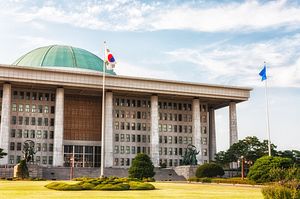Both of South Korea’s main parties took a hit in parliamentary elections Wednesday as voters fed up with their incessant feuds turned to liberal defector Ahn Cheol-soo’s new party to give three-party politics a fighting chance for the first time in 20 years.
In sharp contrast to its hopes for a supermajority, the conservative ruling Saenuri Party tumbled from its slim 152-seat majority to earn 122 of 300 seats in the next National Assembly, slated to convene next month. Forecasters hardly expected that it would fall behind the main opposition Minjoo Party, which slid less dramatically to 123 seats from 127.
The upheaval makes clear that voters had been ready for an alternative to the parties that had produced one of the least productive parliamentary sessions in South Korean history, owing to infighting, elitism, and bipartisan politicking. While the Saenuri Party has been hemorrhaging between those in and outside of President Park Geun-hye’s loyalist faction, the Minjoo Party — which held a record-long filibuster just weeks ago — was not free of blame.
Even after his momentum was seen slipping, rebel party leader Ahn Cheol-soo had touted a “surprise outcome” — and his party performed better than most expected. His People’s Party surged to win 38 seats, nearly sweeping the liberal southwest known as Honam to take the rug out from under the Minjoo Party.
The region consisting of Gwangju and the Jeolla provinces also led the record-high early voter turnout over the weekend, suggesting Honam’s eagerness for an alternative to stalemate establishment politics.
“I can see how badly voters across the nation want to change politics,” Ahn, who defected from the Minjoo Party in a whirlwind last year, said after the polls closed. “I think the election results show the Honam voters’ desire to reform the opposition bloc.”
Now that the two main parties have neck-and-neck influence in parliament, the newly emerged People’s Party has the power to tip the scale on any vote. The political triangle is particularly precarious for the conservative bloc, and puts Park’s administration at risk of lame-duck status for the remaining 20 months of her term.
But the real surprise may have been Ahn’s party’s attractiveness to the right wing. The Saenuri’s loss of some 30 seats was also the People’s Party’s gain, with conservative-leaning voters and politicians dissuaded by the party’s feuds flocking to the fresh alternative.
What exactly that alternative is will only be seen in the coming months. Ahn’s campaign stressed the need for a three-party system to break up the bipartisan deadlock, while failing to outline the new party’s stances. Having been burned by uniting with the liberal opposition as a failed 2012 presidential candidate, Ahn is unlikely to merge with the Minjoo again as he seeks to build up his limelight ahead of next year’s election for the top post.
Ahn will have to take care in forming a unique ideological platform that does not step on the toes of the Minjoo Party. Entering the political arena four years ago as a visionary for a multidimensional political paradigm, the former software entrepreneur must now prove that he can walk the walk. Analysts say his bloc could emerge as a centrist party that caters better to the youth across the spectrum who are fed up with corruption between big chaebol conglomerates and unrelatable politicians.
“The two-party system is pretty corrupt — they’re all in the pockets of the chaebol, which is a huge problem in Korean politics. If Ahn Cheol-soo can actually govern without surrendering the Korean state to big business, that would be a huge improvement in Korean governance,” said Robert Kelly, a political scientist at Korea’s Pusan National University.
“If he’s smart, he’ll take this protest vote and turn it into a real movement. Maybe this is his one chance to get his act together and stand for something.”

































